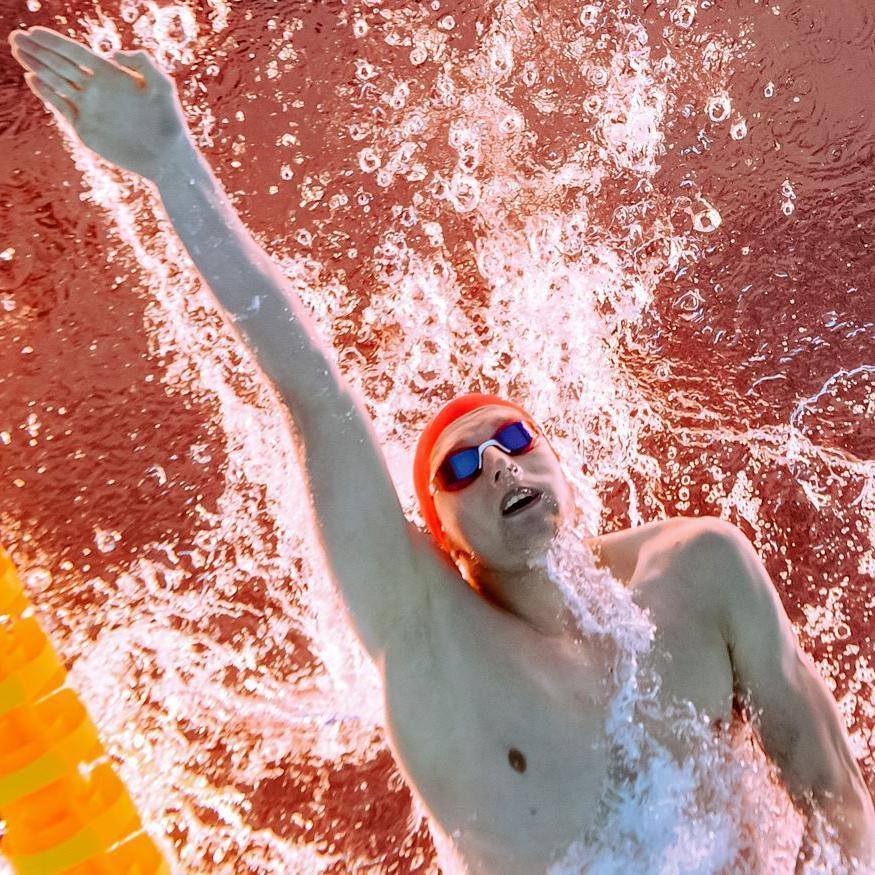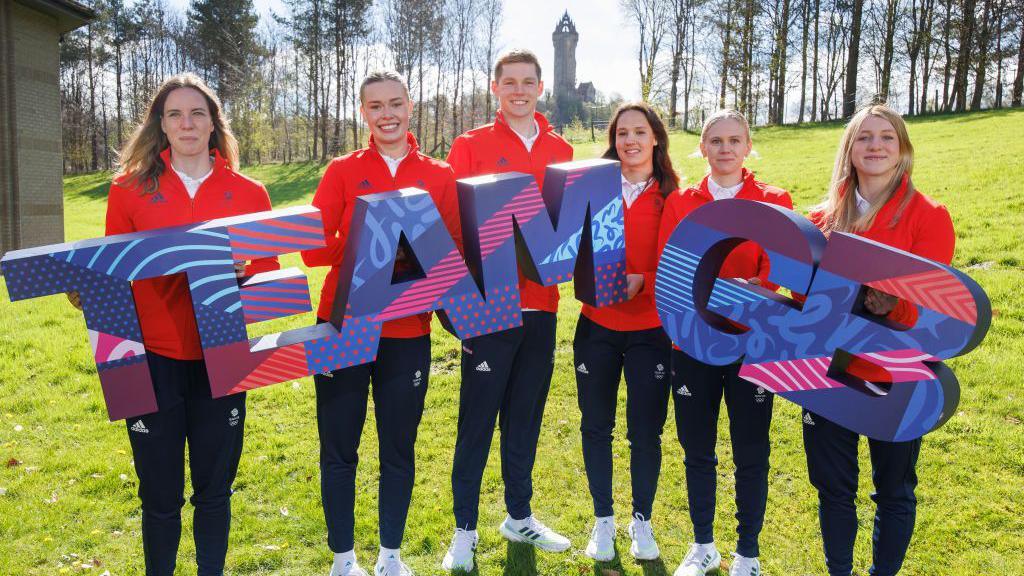The quiet man capable of making big noise in Paris
- Published

People seem reluctant to speak about Duncan Scott.
Ask some of his best pals to describe him, and they become awkward. Even the most garrulous go all coy when talk turns to the 27-year-old.
They're never anything other than cautiously complimentary, but an omerta descends when it comes to disclosing detail about Britain's most decorated Olympic swimmer.
In that, they are mirroring the man himself.
An audience with Scott is reliably engaging. He's intelligent, thoughtful, considered, but readily armed with a sardonic look or withering retort should a boundary be breached.
He's not a man willing to take any of your nonsense.
Ask China's three-time Olympic champion Sun Yang. The convicted doper won 200m freestyle gold in the 2019 World Championships, just a few months after missing another drugs test.
In protest, bronze medallist Scott refused to share a podium with him.
Sun - once labelled the Harry Houdini of doping control - was was enraged. Twice, in full view of the cameras, he hurled abuse at Scott. Twice he was met with that sardonic look.
A few months later, the Chinese swimmer was banned for eight years. "It is deserved," was Scott's restrained response.
How to follow Paris 2024 Olympics across the BBC
- Published26 July 2024
What's happening and when at the Paris Olympics?
- Published10 August 2024
All you need to know about Paris 2024
- Published17 April 2024
Scott was 22 at the time. A young man, but one with the belief that comes from being places, doing things, and winning medals.
The Rio Olympics three years previously had yielded a couple of relay silvers. World team medals followed the year after. Then he returned from the 2018 Commonwealth Games with sixth different slabs of metal around his neck.
The Covid delay to his second Olympics only deferred more success, with 4x200m freestyle gold accompanied by silver in the 4x100 medley.
Perhaps more pertinently, silver also came in individual events, Scott finishing second in both the 200m freestyle and the 200m individual medley.
He will complete in the same two events again in Paris, as well as in a couple of the relays, but it seems there is something different about this version of Scott.
Look at interviews with him at the time of Tokyo and there's still a shyness. His voice is softer. His answers fleeting. His gaze rarely held for long.
Contrast that to now. Still quiet, but forthright. Confident enough to take on difficult topics, such as gender issues in sport, the importance of learning to swim, and pool closures.
And self-assured, too. Earlier this month, he stopped a BBC interview part way though to check on a disturbance at the other end of the room. It spoke to his professionalism, his attention to detail and his discipline.
Talk to those who train with him at the University of Stirling and those words are among the few they let slip. Under the condition of anonymity, of course.
One describes Scott as "the hardest worker I've ever seen". Another considers him "enigmatic, a great guy but one who changes when he goes into competition mode". A third speaks about how he "demands standards and leads by example".
Fellow Team GB member Katie Shanahan picks up on the latter, explaining there is not a training day that goes by when she doesn't learn something from Scott.
"I’m so grateful I can swim with him every day," she says. "He’s given us so much good advice and I know how much work he puts in."
Yeah, but what is he really like?
"He’s… just Duncan. I don’t know how to describe him," the relentlessly chatty Shanahan says, stuttering. "I’m lucky that I get to see the human side of him, and he’s just a really nice guy. He’s funny, and very down to earth."

Scott sets the standards for the swimming squad at the University of Stirling
In the pool and the gym, Scott is the lavishly-decorated Olympian and leader of a hugely success Stirling squad, seven of whom will be in Paris.
But in the cafe at their training base, he's just another one of the team as he devours his regular weekday black pudding and bacon roll with brown sauce.
Given he will have been up since 06:45 BST and worked like a bear in the intervening hours, Scott need not calorie count. Just as well, given his day will tend to start with a bowl of chocolate cereal in bed.
Then it's the 10-minute commute to the pool, a couple of hours in the water, and into the gym after his morning roll. He'll then head home for more food and a nap before another pool session later in the afternoon.
More often than not, he falls asleep on the couch after returning home before heading to bed at 21:30.
Some would chafe against such a restrictive routine, but Scott has long since grown used to having his days determined in such a way.
In 2009, he earned a swimming scholarship at Strathallan private school in Perthshire and boarded there for all of his secondary education.
"He'd get discouraged because he was away from home," Scott's long-time coach Steven Tigg recalled in 2022. "And he was better than the rest, so he was only racing against the clock.
"We'd say to him when he goes to an Olympics, it would be just like this and that this was preparing him for it.
"Whenever he was huffing or not trying, we'd tell him one of his rivals was training really hard somewhere, and that kicked him on."
Not good enough for Olympic gold in one sport? Just take up another...
- Published31 July 2024
The three and a half minutes that has been years in the making
- Published4 August 2024
What's it really like being an athlete at the Olympics?
- Published17 July 2024
Scott first learned to swim during a two-week holiday course in Troon.
Football, rugby and tennis were his sporting interests at that time, but the sweetie shop near the leisure centre did give going at the pool extra appeal.
Then, when the family - Duncan, dad Nigel, mum Joy and sister Alexandria - moved from Kilmarnock to Alloa in 2005, both siblings were taken to the local swim club for a trial. Tigg had just started there as a coach.
"Duncan just was coming up for eight and I just thought, 'this kid is really, really good', even though he was quite spidery," said Tigg, who trained the brother and sister weekly for a couple of years.
At that time - and for quite a while afterwards - Scott was exceedingly slight and skinny. His contemporaries matured more quickly and reaped the benefits of their greater strength and heavier training load.
But their wee Scottish rival would not be cowed despite his more heuristic approach.
"I've got a really funny picture of him in a relay team at a British Boys event," said Tigg. "He was the smallest by miles among these 15, 16 year olds. But he was still competitive and he had so much scope to grow as a swimmer."
And so it proved. Now Scott will look to add to his six Olympic medals in Paris, with an individual gold perhaps the one thing missing.
As well as a gruelling schedule, he will come up against home favourite Leon Marchand in the 200 IM. Ask him about that prospect, and he is unmoved.
For Paris, in the lane next to Marchand, surrounded by screaming French fans, read Stirling, sleepy, after falling out of bed with a belly full of Chocolate Weetos. It's all about process, routine and schedule for Scott.
"It's just four lengths of the baths," says former team-mate and close friend Ross Murdoch. As ever, when it comes to Scott, just a few words will suffice.